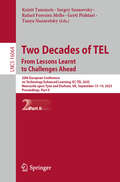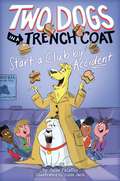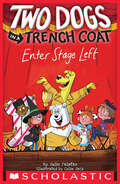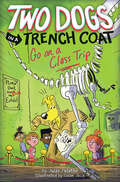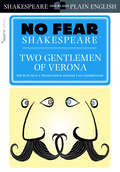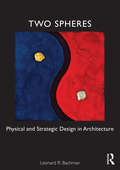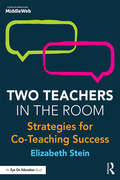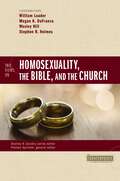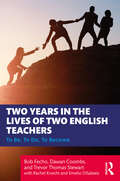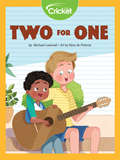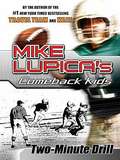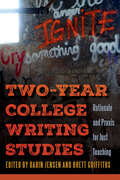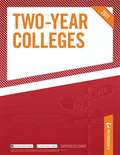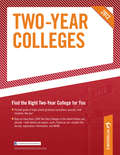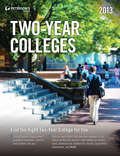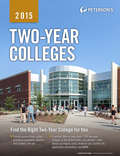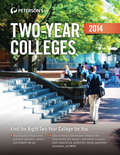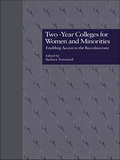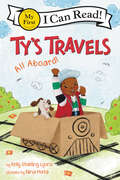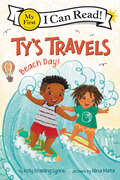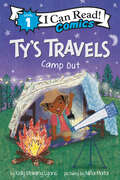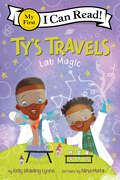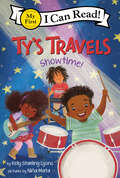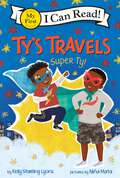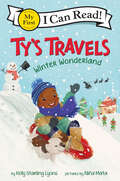- Table View
- List View
Two Decades of TEL. From Lessons Learnt to Challenges Ahead: 20th European Conference on Technology Enhanced Learning, EC-TEL 2025, Newcastle upon Tyne and Durham, UK, September 15–19, 2025, Proceedings, Part II (Lecture Notes in Computer Science #16064)
by Sergey Sosnovsky Rafael Ferreira Mello Gerti Pishtari Kairit Tammets Tanya NazaretskyThe two-volume set LNCS 16063-16064 constitutes the proceedings of 20th European Conference on Technology Enhanced Learning, EC-TEL 2025, which took place in Newcastle upon Tyne and Durham, UK, September 2025. The total of 43 full papers, including 37 research papers, 4 blue-sky and 2 industry papers, as well as 16 demos and 32 posters papers presented in EC-TEL 2025 proceedings was carefully reviewed and selected from 195 submissions. They focus on all aspects of dynamic interdisciplinary field, bridging pedagogy, educational psychology, and digital technology.
Two Dogs in A Trench Coat Start a Club by Accident
by Julie FalatkoSassy and Waldo love school! They get to wear a trench coat and everyone thinks they're a new student named Salty. Except Stewart. He knows the truth. But then Stewart has to stay after school for a club. <p><p> Sassy and Waldo know that a club is a sandwich. But it's not that kind of club. <p> Sassy and Waldo go to the best place to wait for Stewart in the empty school: the cafeteria! Snacks! Running! Places to nap! <p> Their classmates find out what Salty is doing there and they want in on the club. <p> Only it's not the sandwich kind.
Two Dogs in a Trench Coat Enter Stage Left (Two Dogs in a Trench Coat #4)
by Julie FalatkoSassy and Waldo are good dogs in the spotlight when their class puts on a school play!Sassy and Waldo love to have fun!Like when they put on their trench coat and everyone think they're a student named Salty.Stewart knows the truth though. He is their best boy.Their whole class is doing a school play.Play? Dogs love to play!But now Stewart is acting like a different person. An evil person.Sassy and Waldo need to get their boy back!Even if it means doing that other kind of play.
Two Dogs in a Trench Coat Go on a Class Trip (Two Dogs in a Trench Coat #3)
by Julie FalatkoSassy and Waldo are good dogs about to be let loose on their first class trip!Sassy and Waldo love trips!When they put on their trench coat, everyone thinks they're a human kid named Salty.They can go to all the places that don't let dogs in. Like school. And the museum.Stewart says the museum is all facts and learning. He is not excited to go there.But Sassy and Waldo have a permission slip that says lunch on it.How can a trip to a place with lunch be bad?Sassy and Waldo are very excited for their class trip.And that's before they find out about the giant bones.
Two Gentlemen of Verona: No Fear Shakespeare Side-by-Side Plain English (No Fear Shakespeare)
by William Shakespeare SparkNotesRead Shakespeare&’s plays in all their brilliance—and understand what every word means! Don&’t be intimidated by Shakespeare! These popular guides make the Bard&’s plays accessible and enjoyable.Each No Fear guide contains:The complete text of the original playA line-by-line translation that puts the words into everyday languageA complete list of characters, with descriptionsPlenty of helpful commentaryDiscover the play that may have been Shakespeare&’s first. Proteus is in love with the coy Julia—but when he travels to Verona and meets Silvia, the object of his best friend Valentine&’s passion, Proteus instantly desires her, too. It isn&’t long before Proteus betrays Valentine in hopes of winning Silvia. But meanwhile Julia has her own plans to get involved . . .
Two Spheres: Physical and Strategic Design in Architecture
by Leonard BachmanExplaining the connection between physical and strategic design, this book proposes an aesthetic connection between two equal aspects of architectural design: the Real and the Ideal. Addressing architectural thinkers from the broad realms of academia and practice, it is suitable either as a seminar text, a guide to contemporary design issues, or as a theoretical work. Beginning with a historical perspective, the book looks at some of the key conflicts in architectural thought that were brought about by postindustrial change. The discussion shifts to clearly describe the forms of complexity, how these have interacted with architecture and the possibilities in fully embracing complexity in architectural practice. Although there are many books focusing on complexity science, there are few that focus on the relationship between complexity and design and none which take such a comprehensive approach.
Two Teachers in the Room: Strategies for Co-Teaching Success
by Elizabeth SteinThis new co-publication from Routledge and MiddleWeb provides a wealth of practical strategies and tips to help K–12 educators co-teach more effectively. Author Elizabeth Stein presents examples of different co-teaching models and shows how to cultivate a dynamic co-teaching relationship to benefit all students. Whether you’re a brand new co-teacher or are simply looking to improve the dynamics in your classroom, the research-based strategies, vignettes, and ready-to-use assessment rubrics in this book will help you create a positive learning culture that influences all learners, teachers, and students alike. Topics include: Selecting and implementing the appropriate co-teaching model to optimize student learning; Developing an effective curriculum that plays to the strengths of both teachers; Creating a learning environment that promotes self-reflection and nurtures critical thinking; Accommodating all learners by embracing a multi-dimensional view of teacher knowledge; and Providing specific, attentive feedback to help students take charge of their learning. The book also features book discussion questions for each chapter so you can work with colleagues during book studies and PLCs.
Two Views on Homosexuality, the Bible, and the Church (Counterpoints: Bible and Theology)
by Stanley N. Gundry Preston Sprinkle Stephen R. Holmes Wesley Hill Megan K. Defranza William LoaderNo issue is more divisive or more pressing for the church today than homosexuality. Two Views on Homosexuality, the Bible, and the Church brings a fresh perspective to a well-worn debate. While Christian debates about homosexuality are most often dominated by biblical exegesis, this book seeks to give much-needed attention to the rich history of received Christian tradition, bringing the Bible into conversation with historical and systematic theology. To that end, both theologians and biblical scholars—well accomplished in their fields and conversant in issues of sexuality and gender—articulate and defend each of the two views:Affirming viewWilliam LoaderMegan K. DeFranza Traditional viewWesley HillStephen R. HolmesUnique among most debates on homosexuality, this book presents a constructive dialogue between people who disagree on significant ethical and theological matters, and yet maintain a respectful and humanizing posture toward one another. Even as these scholars articulate pointed arguments for their position with academic rigor and depth, they do so cordially, clearly, and compassionately, without demeaning the other.The main essays are followed by exceptionally insightful responses and rejoinders that interact with their fellow essayists with convicted civility. Holding to a high view of Scripture, a commitment to the gospel and the church, and a love for people—especially those most affected by this topic—the contributors wrestle deeply with the Bible and theology, especially the prohibition texts, the role of procreation, gender complementarity, and pastoral accommodation.The book concludes with general editor Preston Sprinkle’s reflections on the future of discussions on faith and sexuality.
Two Years in the Lives of Two English Teachers: To Be, To Do, To Become
by Bob Fecho Dawan Coombs Trevor Thomas Stewart Rachel Knecht Emelio DiSabatoThis book invites readers to explore the complexity of becoming a teacher through the stories of two novice ELA teachers, Emelio and Rachel, over the course of their first two years. The authors’ detailed, empathetic, and ethnographic approach allows space for the teachers to reveal little-seen and often overlooked "wobble moments." These moments illuminate the complexity and nuances that confront, confound, and compel teachers to remain in dialogue with practice. Documenting the journeys of two teachers with compassion and intellectual rigor, this book provides insights into and challenges preconceived notions of what it means to be a teacher. It is essential reading for preservice teachers, scholars, and researchers in English education, as well as individuals considering teaching as a profession.
Two for One
by Michael LeannahPetey has been practicing playing his guitar for the school talent show. He plans to perform a song he wrote himself. One day he hurts his arm and has to wear a cast. How can he play guitar now? A good friend shows him how.
Two-Minute Drill
by Mike LupicaChris Conlan is the coolest kid in sixth grade - the golden-armed quarterback of the football team and the boy all the others look up to. Scott Parry is the new kid, the boy with the huge brain, but with feet that trip over themselves. These two boys may seem like an odd couple, but each has a secret that draws them together, and proves that the will to succeed is even more important than raw talent.
Two-Year College Writing Studies: Rationale and Praxis for Just Teaching
by Darin Jensen Brett GriffithsTwo-Year College Writing Studies is a comprehensive overview of the two-year college writing teaching experience within our current political and historical contexts, with examples for teachers to better enact just teaching practices in their colleges. Editors Darin Jensen and Brett Griffiths present grounded, well-theorized, and practical strategies for teachers to implement in classrooms, institutions, and geopolitical contexts to advocate more effectively for their students. Contributors draw on theories of identity, rhetorical third space, and linguistics to articulate a praxis of just teaching. They describe existing institutional challenges and opportunities that foster equity and offer cautionary tales of educational systems dismantled for short-term economic and political gains. Two-year college writing studies—when properly resourced—holds the potential to foster (or undermine) democratic ideals of civic literacy and uplift. Chapters in this volume offer case study examples of changes in departmental practices for reflection, interaction, and assessment that empower faculty to break free and engage directly with institutional, regional, state, and national constraints. By making these resilient practices visible, Two-Year College Writing Studies amplifies the voices and validates the experiences of instructors engaging in this work. It will serve generalists, specialists, and academics interested in the subdiscipline of student success pedagogies and the political histories of two-year colleges and be useful for instructors new to the field, as professional development for veteran instructors, and as an introduction for graduate students entering two-year college writing studies programs.
Two-Year Colleges 2011
by Peterson’sPeterson's Two-Year Colleges 2011 includes information on nearly 2,000 accredited two-year undergraduate institutions in the United States and Canada, as well as some international schools. It also includes scores of detailed two-page descriptions written by admissions personnel. College-bound students and their parents can research two-year colleges and universities for information on campus setting, enrollment, majors, expenses, student-faculty ratio, application deadline, and contact information. SELLING POINTS: Helpful articles on what you need to know about two-year colleges: advice on transferring and returning to school for adult students; how to survive standardized tests; what international students need to know about admission to U. S. colleges; and how to manage paying for college State-by-state summary table allows comparison of institutions by a variety of characteristics, including enrollment, application requirements, types of financial aid available, and numbers of sports and majors offered Informative data profiles for nearly 2,000 institutions, listed alphabetically by state (and followed by other countries) with facts and figures on majors, academic programs, student life, standardized tests, financial aid, and applying and contact information Exclusive two-page in-depth descriptions written by college administrators for Peterson's Indexes offering valuable information on associate degree programs at two-year colleges and four-year colleges-easy to search alphabetically
Two-Year Colleges 2012
by Peterson'SPeterson's Two-Year Colleges 2012 includes information on more than 1,800 accredited two-year undergraduate institutions in the United States and Canada, as well as some international schools. It also includes detailed two-page descriptions written by admissions personnel. Inside you'll also find: Detailed information on campus setting, enrollment, majors, expenses, student-faculty ratio, application deadline, and contact information. Helpful articles on what you need to know about two-year colleges: advice for adult students on transferring and returning to school ; how to survive standardized tests; what international students need to know about admission to U.S. colleges; how to manage paying for college; and interesting "green" programs at two-year colleges State-by-state summary table allows comparison of institutions by a variety of characteristics, including enrollment, application requirements, types of financial aid available, and numbers of sports and majors offered Informative data profiles for more than 1,800 institutions, listed alphabetically by state (and followed by other countries) with facts and figures on majors, academic programs, student life, standardized tests, financial aid, and applying and contact information Indexes offering valuable information on associate degree programs at two-year colleges and four-year colleges-easy to search alphabetically
Two-Year Colleges 2013
by Peterson'S PublishingPeterson's Two-Year Colleges 2013 includes information on more than 1,800 accredited two-year undergraduate institutions in the United States and Canada, as well as some international schools. <P><P>It also includes detailed two-page descriptions written by admissions personnel. College-bound students and their parents can research two-year colleges, including community colleges, for information on campus setting, enrollment, majors, expenses, student-faculty ratio, application deadline, and contact information. In addition, Two-Year Colleges offers articles that cover tips on transferring, advice for adults returning to school, "green" programs at community colleges, the basics of financial aid, and much more.:<P>Up-to-date, informative data profiles for more than 1,800 institutions, listed alphabetically by state (and followed by other countries) with facts and figures on majors, academic programs, student life, standardized tests, financial aid, and applying and contact information. <P>Helpful articles on what you need to know about two-year colleges: advice on transferring and returning to school for adult students; how to survive standardized tests; what international students need to know about admission to U.S. colleges; and how to manage paying for college. <P>The latest on exciting, innovative "green" programs at community colleges throughout the United States.<P>State-by-state summary table allows comparison of institutions by a variety of characteristics, including enrollment, application requirements, types of financial aid available, and numbers of sports and majors offered.
Two-Year Colleges 2013
by Peterson'sPeterson's Two-Year Colleges 2013 includes information on more than 1,800 accredited two-year undergraduate institutions in the United States and Canada, as well as some international schools. It also includes detailed two-page descriptions written by admissions personnel. College-bound students and their parents can research two-year colleges, including community colleges, for information on campus setting, enrollment, majors, expenses, student-faculty ratio, application deadline, and contact information. In addition, Two-Year Colleges offers articles that cover tips on transferring, advice for adults returning to school, "green" programs at community colleges, the basics of financial aid, and much more.
Two-Year Colleges 2014
by Peterson'S PublishingPeterson's Two-Year Colleges 2014 includes information on more than 1,900 accredited two-year undergraduate institutions in the United States and Canada, as well as some international schools. <P><P>It also includes detailed two-page descriptions written by admissions personnel. College-bound students and their parents can research two-year colleges, including community colleges, for information on campus setting, enrollment, majors, expenses, student-faculty ratio, application deadline, and contact information. In addition, Two-Year Colleges offers articles that cover tips on transferring, advice for adults returning to school, "green" programs at community colleges, the basics of financial aid, and much more. <P>Up-to-date data profiles for more than 1,900 institutions, listed alphabetically by state (and followed by other countries) with facts and figures on majors, academic programs, student life, standardized tests, financial aid, and applying and contact information. <P>Helpful articles on what you need to know about two-year colleges: advice on transferring and returning to school for adult students; how to survive standardized tests; what international students need to know about admission to U.S. colleges; and how to manage paying for college.<P> The latest on exciting, innovative "green" programs at community colleges throughout the United States.<P> State-by-state summary table allows comparison of institutions by a variety of characteristics, including enrollment, application requirements, types of financial aid available, and numbers of sports and majors offered. <P> Exclusive two-page in-depth descriptions written by college administrators for Peterson's. <P> Indexes offering valuable information on associate degree programs at two-year colleges and four-year colleges-easy to search alphabetically.<P>
Two-Year Colleges for Women and Minorities: Enabling Access to the Baccalaureate (RoutledgeFalmer Studies in Higher Education)
by Barbara TownsendTwo-year colleges are often the most financially, geographically, and academically accessible means of higher education for ethnic minorities and women. This book examines five types of two-year special focus schools.
Ty's Travels: All Aboard! (My First I Can Read)
by Kelly Starling LyonsA Geisel Honor-winning series! "Both an excellent book for guided reading and a winning read-aloud." —Kirkus (starred review)Join Ty on his imaginative adventures in Ty's Travels: All Aboard!, a My First I Can Read series by acclaimed author and illustrator team Kelly Starling Lyons and Niña Mata. Family time and imagination and play are highlighted in this fun story, perfect for sharing with children 3 to 6.Ty wishes his family would play with him, but everyone is too busy before dinnertime. Luckily, Ty knows just what to do… Time for fun. Celebrate the power of imagination in All Aboard!With simple, rhythmic text and joyful, bright art, this Guided Reading Level I and My First series is perfect for shared reading with a child. Books at this level feature basic language, word repetition, and whimsical illustrations, ideal for sharing with emergent readers. The active, engaging stories have appealing plots and lovable characters, encouraging children to continue their reading journey.A Chicago Public Library Best Fiction Book for Young Readers 2020 * A 2021 Here Wee Read Ultimate Diverse Children's Book * Author Kelly Starling Lyons selected as the 2021 Piedmont Laureate
Ty's Travels: Beach Day! (My First I Can Read)
by Kelly Starling LyonsA Geisel Honor-winning series * Author Kelly Starling Lyons selected as the 2021 Piedmont Laureate * A Bank Street Best Children's Book of the Year 2022Join Ty on his imaginative adventures in Ty's Travels: Beach Day!, a My First I Can Read book by acclaimed author and illustrator team Kelly Starling Lyons and Niña Mata. Friendship and imagination and play are highlighted in this fun story, perfect for sharing with children 3 to 6.Ty turns an ordinary day in the sandbox into a fun beach day. He wiggles his toes in the sand, finds seashells, builds a castle, and splashes in the ocean. Splish, splash! When his neighbor’s beach ball flies into his backyard, Ty learns that a beach day is even better with a friend.With simple, rhythmic text and joyful, bright art, this My First series and Guided Reading Level I is perfect for shared reading with a child. Books at this level feature basic language, word repetition, and whimsical illustrations, ideal for sharing with emergent readers. The active, engaging stories have appealing plots and lovable characters, encouraging children to continue their reading journey.
Ty's Travels: Camp Out (I Can Read Comics Level 1)
by Kelly Starling LyonsTy makes his I Can Read Comic debut! Featuring a bold comic styling by New York Times bestselling illustrator Niña Mata and a compelling easy-to-read text by Kelly Starling Lyons, this Level One I Can Read Comic is the perfect summertime story for beginning readers! Celebrate Ty’s vivid imagination! Nonstop rain dampens the family’s plans to go camping. But with a boost from Ty, the Camp-Out comes out just fine! Rhythmic text, vibrant art, family love, and Black Boy Joy shine on every page of this camping adventure.Ty’s Travels: Camp-Out is a Level One I Can Read Comic, which means it’s perfect for shared reading with young readers new to graphic novel storytelling. This is a Guided Reading Level (GRL) J.The Ty’s Travels series is much acclaimed-—including a Geisel Honor for Zip, Zoom!
Ty's Travels: Lab Magic (My First I Can Read)
by Kelly Starling Lyons“This installment in the Geisel-winning Ty's Travels series adds some much-needed diversity to the beginning-reader shelf” —Booklist Join Ty on his imaginative adventures in Ty's Travels: Lab Magic, a My First I Can Read book by acclaimed author and illustrator team Kelly Starling Lyons and Niña Mata. Science exploration, imagination, and play are highlighted in this fun story, perfect for sharing with children 3 to 6.Ty and Corey love to visit the museum. When they step through the doors, they become scientists. They study bugs and hunt for fossils. They catch the wind. When Ty can’t participate in a lab activity because of his age, he uses his big imagination at home. Discovering new things is so much fun!Join Ty on his science adventure in this My First I Can Read for beginning readers. With simple, rhythmic text and joyful, bright art, this My First I Can Read book, Guided Reading Level I, is perfect for shared reading with a child. Books at this level feature basic language, word repetition, and whimsical illustrations, ideal for sharing with emergent readers. The active, engaging stories have appealing plots and lovable characters, encouraging children to continue their reading journey.Other acclaim for the Ty's Travels series includes:A Chicago Public Library Best Fiction Book for Young ReadersTy's Travels: All Aboard is a Here Wee Read Ultimate Diverse Children's BookAuthor Kelly Starling Lyons has been selected as the 2021 Piedmont Laureate"Both an excellent book for guided reading and a winning read-aloud." —Kirkus (starred review)
Ty's Travels: Showtime! (My First I Can Read)
by Kelly Starling LyonsTy rocks out with friends in this new book in the Geisel Honor–winning series! Join Ty on his imaginative adventures in Ty's Travels: Showtime, a My First I Can Read story by acclaimed author and illustrator team Kelly Starling Lyons and Niña Mata. Music, imagination, and play are highlighted, making this perfect for sharing with children ages 3 to 6.Rap-a-tap-tap!Thrum, thrum, thrum!Plink-a-plink-plink!Ty loves playing the instruments, but something’s missing—his friends! With the help of his vivid imagination, Ty and his friends are onstage in a band making great music together.With simple, rhythmic text and joyful, bright art, this My First series is perfect for shared reading with a child. Books at this level feature basic language, word repetition, and whimsical illustrations, ideal for sharing with emergent readers. The active, engaging stories have appealing plots and lovable characters, encouraging children to continue their reading journey.Praise for Ty's Travels series:Ty’s Travels: All Aboard has been named United Through Reading's 2024 Book for the Military Child.
Ty's Travels: Super Ty! (My First I Can Read)
by Kelly Starling LyonsTy soars as a superhero in this new book in the Geisel Honor–winning series!Join Ty on his fun adventures in Ty’s Travels: Super Ty!, a My First I Can Read book by acclaimed author and illustrator team Kelly Starling Lyons and Niña Mata. Imagination, helpfulness, and play are highlighted, making this book perfect for sharing with emerging readers!Ty loves superheroes. He watches them on TV and reads books about them.When he puts on a cape and a mask, he becomes Super Ty! Super Ty flies around helping Momma and others. But even with his super skills, he can't solve every problem by himself. That’s what Ty’s super friends are for—like his brother!With simple, rhythmic text and joyful, bright art, this My First series is perfect for shared reading with a child. Books at this level feature basic language, word repetition, and whimsical illustrations, ideal for sharing with emergent readers. The active, engaging stories have appealing plots and lovable characters, encouraging children to continue their reading journey.Don’t miss these other books in the series:· Ty's Travels: Showtime!· Ty's Travels: Camp-Out· Ty's Travels: Lab Magic· Ty's Travels: Winter Wonderland· Ty's Travels: Beach Day!· Ty's Travels: Zip, Zoom!· Ty’s Travels: A 5-Book Reading Collection
Ty's Travels: Winter Wonderland (My First I Can Read)
by Kelly Starling LyonsA Geisel Honor-winning series! Author Kelly Starling Lyons selected as the 2021 Piedmont Laureate! Join Ty on his imaginative adventures in Ty's Travels: Winter Wonderland, a My First I Can Read book by acclaimed author and illustrator team Kelly Starling Lyons and Nina Mata. Imagination and play are highlighted in this festive Winter story, perfect for sharing with children 3 to 6.Ty’s big imagination takes him and Momma on a trip to the North Pole. Everything is wonderful! A Christmas tree sparkles, a snowman waves, and a polar bear sings. Will Ty’s wish to see Santa come true? He wishes and wishes. Ty's Travels: Winter Wonderland fills an important need for inclusive Christmas stories with diverse characters.With simple, rhythmic text and joyful, bright art, this My First series and Guided Reading Level I is perfect for shared reading with a child. Books at this level feature basic language, word repetition, and whimsical illustrations, ideal for sharing with emergent readers. The active, engaging stories have appealing plots and lovable characters, encouraging children to continue their reading journey."A cozy, snowy Christmastime read." —Kirkus
